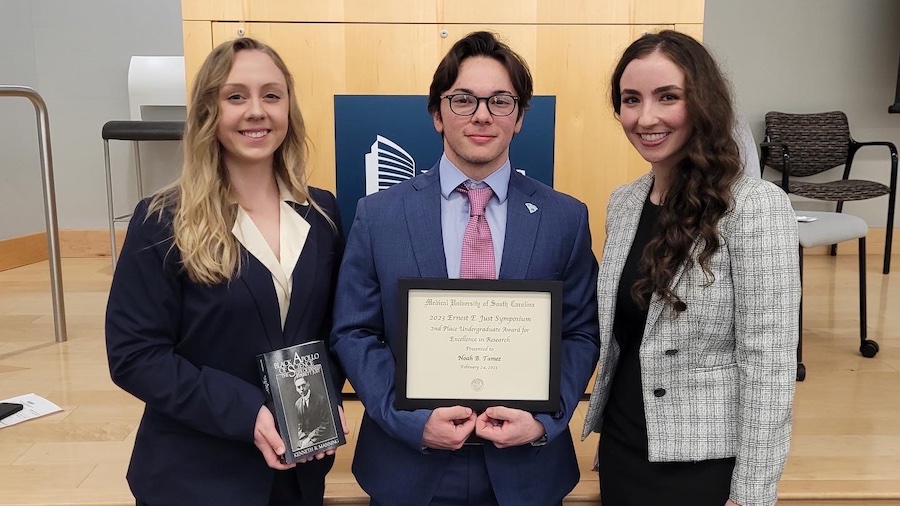Over the years the Anderson University Center for Cancer Research has been involved in extensive research of fruit and plant extracts and their ability to fight cancer cells.
Student cancer research was again recognized at the Ernest Everett Just Symposium February 23 at the Medical University of South Carolina (MUSC) in Charleston; winning a Second Place award for national research on a Mediterranean herb.
At this year’s symposium, Noah Tamez, a senior from Fort Mill majoring in Kinesiology, and Abigail Broom, a junior from Pickens majoring in Biochemistry, gave an undergraduate presentation titled “Cytotoxic Effects of Thymus vulgaris on HTB-26, HCC-38, and BT-483 Cell Lines.” Under the supervision of Dr. Diana Ivankovic, director of the Anderson University Center for Cancer Research, Tamez and Broom worked on a team with Gianna DeRosa, a senior from Simpsonville majoring in Biology.
Past symposium winners included Maya Learmonth, winning second place; Jamena (Crissy) Anderson, with Zoe Sanders and Maddie Treaster, winning first place; and Rakish Taylor, Jonathan Low, Eslie Aguilar, winning second place in a national research competition.
Previous symposium winner Learmonth is currently a PREP scholar at MUSC and has been accepted into the Mayo Clinic Graduate School of Biomedical Sciences. She will be starting her Ph.D. program in July, 2023, at their Jacksonville, Florida, campus.
“Jonathan, Zoe and Eslie are all currently exemplary medical students, while Rakish, Crissie and Maddie are successfully employed in their field of work,” Ivankovic said.
“Right now, our cancer treatments are usually combined with some other form of treatment, such as chemotherapy or radiation. I think our main takeaway from this is, including some naturopathic remedies could be a more beneficial treatment compared to our chemo and radiation. It’s something that definitely needs to be explored more,” Tamez said. “We took three different cell lines and exposed them to thyme, a Mediterranean herb. We picked this one specifically because what we were finding in our research studies was that all these countries that bordered the Mediterranean Sea were having significantly lower cancer rates than what we would find here in America or somewhere like the United Kingdom. We started looking at their food—specifically from a culture aspect—things that could be grown in that native region that they all might be using.”
Working alongside Tamez and DeRosa, Broom feels blessed to walk in the footsteps of those who came before her at the Anderson University Center for Cancer Research in their quest to find a cure in nature.
“The Cancer Center has done different experiments with different extracts. Marjoram, which is essentially oregano, they’ve done in the past. This semester we decided to look at the cytotoxic effects of thyme and persimmon extracts. Last semester we specifically did thyme, and now we’re working with both thyme and persimmon,” Broom said. “This is just one direction that we’re taking to see how we can support naturopathic remedies to help cancer patients deal with the side effects and treatment of cancer in a more natural way.”
DeRosa is thankful that she and other students working in the Anderson University Center for Cancer Research are given opportunities normally unavailable to undergraduate students.
“I have never really seen cancer research or heard of it on a cellular level like this, where you’re actually growing these cells and treating them with different extracts. I also think it is a unique experience specific to Anderson, because I have talked to a lot of my friends at other colleges. They’ve never even heard of people having this opportunity at the undergraduate level,” DeRosa said.
Tamez praised DeRosa for her guidance in the research, saying “She was the one that basically taught me all my techniques, procedures, and protocols we use to conduct these experiments. She was really the one who helped me get settled into the Center for Cancer Research.”
“Of course, this is nowhere ready to actually become a treatment; you’ve got to go through lots of red tape, FDA approval, multiple clinical trials, but I think our main takeaway is that it shows the scientific community along with the rest of the world that these pharmaceutical drugs are not necessarily the only way to treat cancer,” Tamez said. “It’s really quite hard to put into words how much the Center for Cancer Research has helped the cancer research students… It allows us to put out great quality work. Professionals, other scientists, journal articles and publications see our work and they feel like it’s quality enough to actually put in their journals, which is a dream for a researcher.”
Hosted by the MUSC College of Graduate Studies each February, the Ernest Everett Just Symposium celebrates the life of the noted African-American biologist with a day devoted to providing information to undergraduate students about opportunities in all of the colleges at MUSC. Morning keynote talks focus on the life and history of Ernest E. Just and have student speakers who talk about their research projects.
About the Anderson University Center for Cancer Research
For more than a decade, students in the Anderson University Center for Cancer Research have advanced-level opportunities for research on the undergraduate level. They work with advanced equipment and skilled researchers to study cancer treatments and causes, all with a focus on community outreach and education. The center has been recognized and honored by South Carolina’s scientific community. Also, many students have received awards and grants for their research. Dr. Ivankovic, a cellular biology textbook author, and herself a breast cancer survivor, has led cancer research for years at Anderson University for the past 19 years. More information about the Anderson University Center for Cancer Research can be found online.

